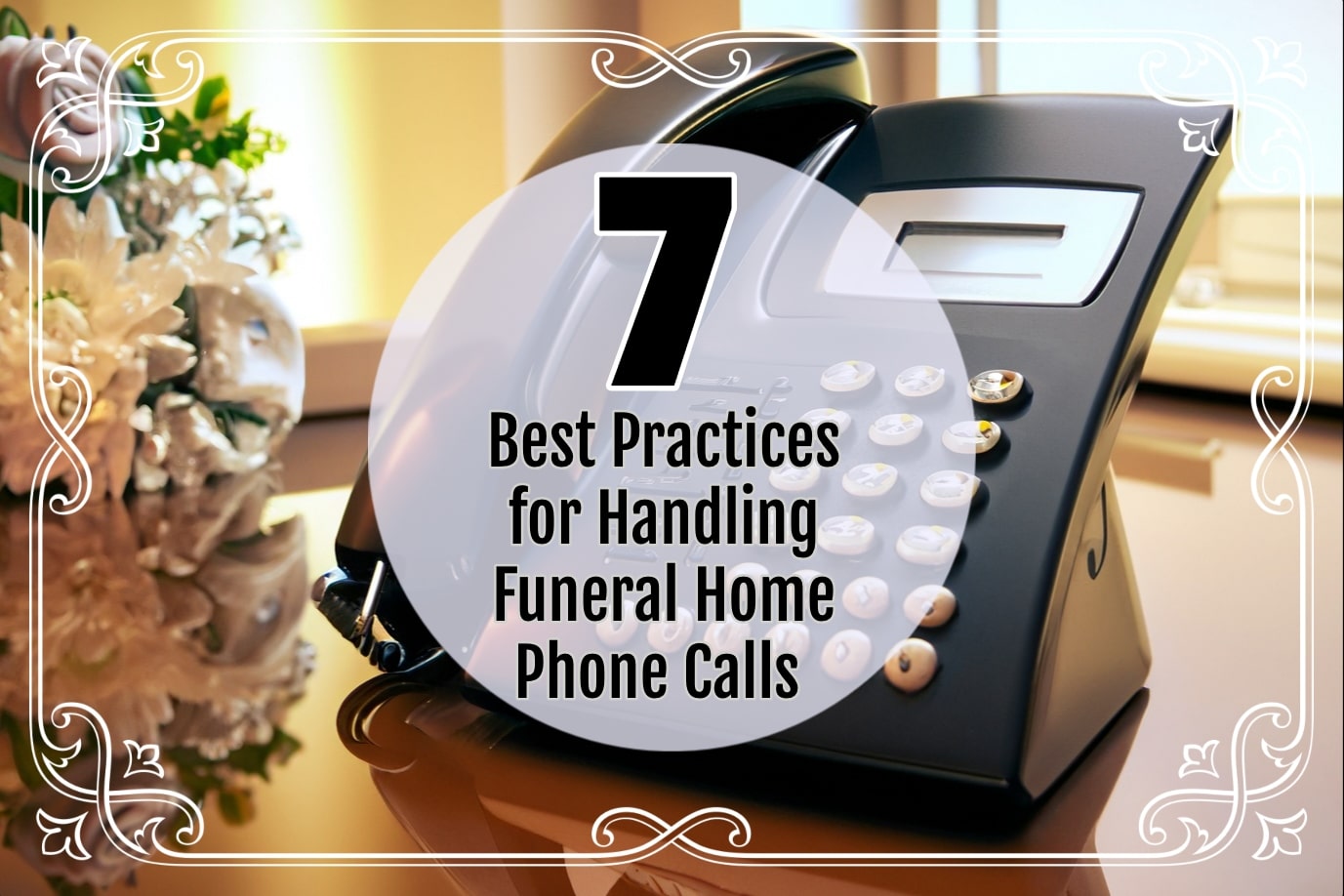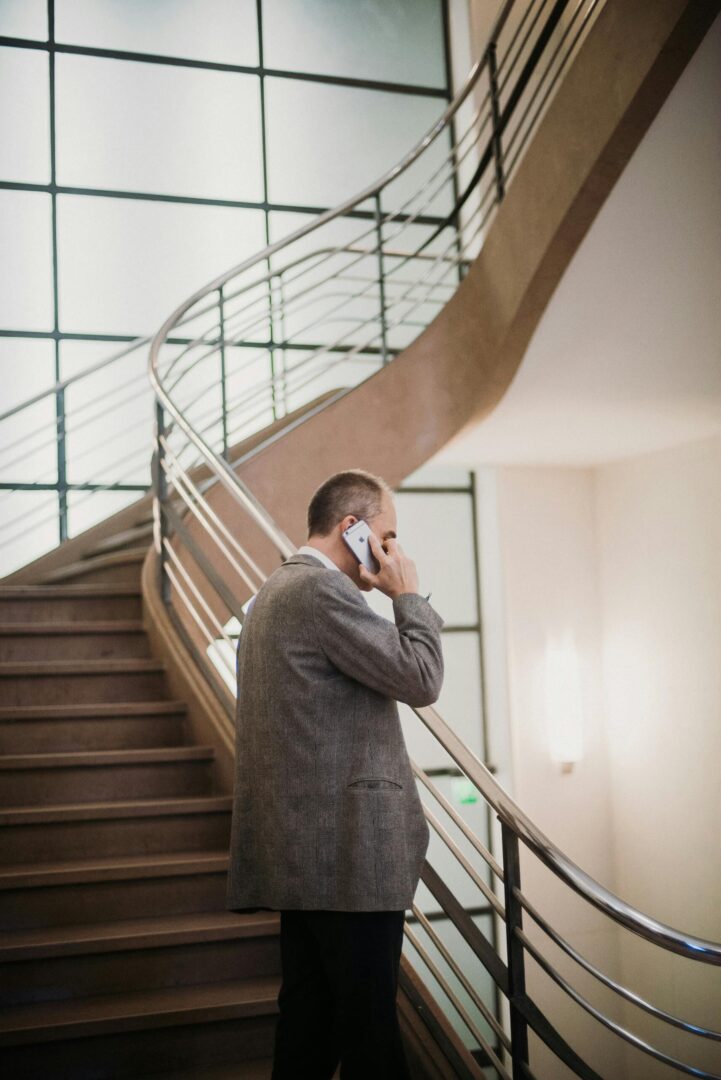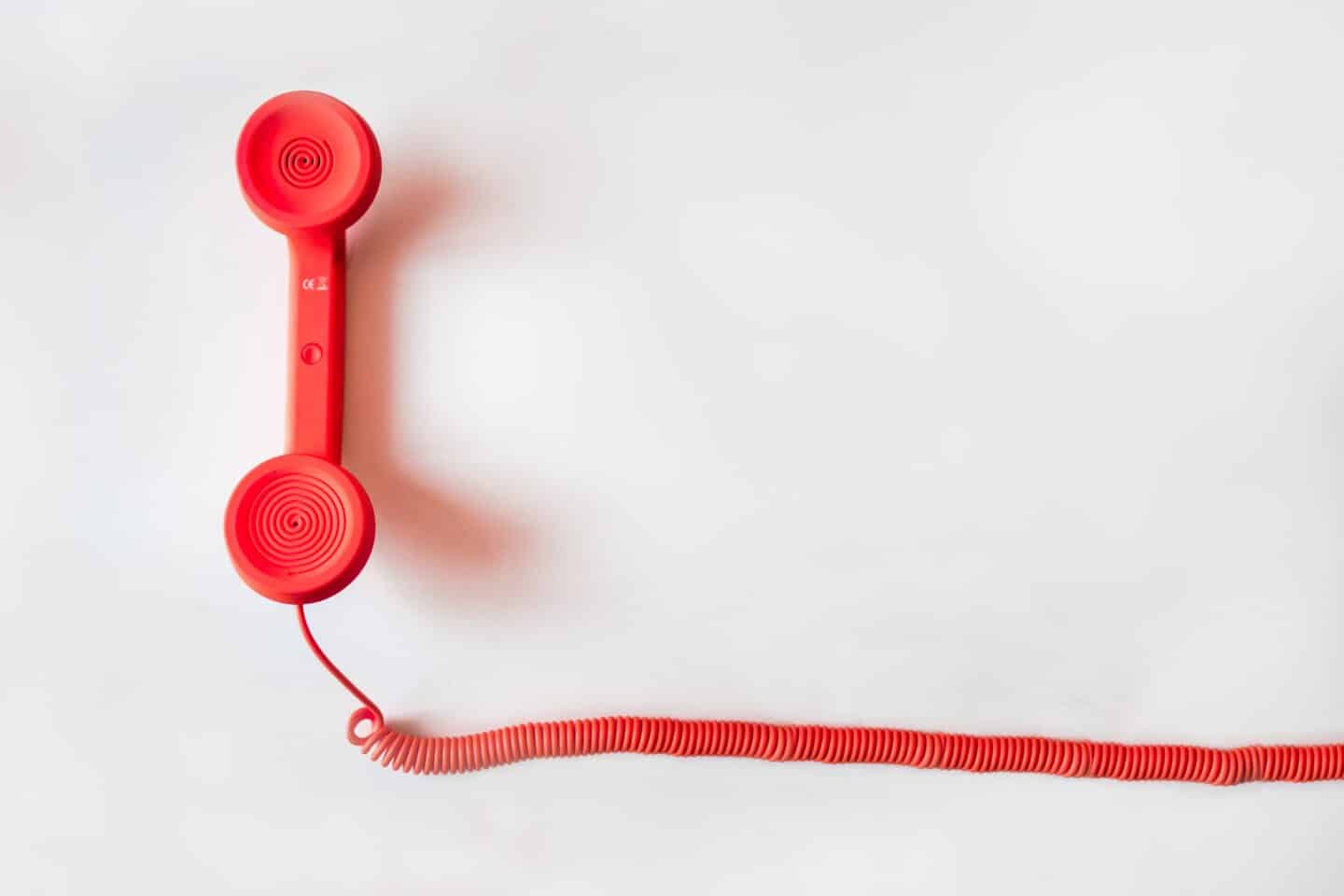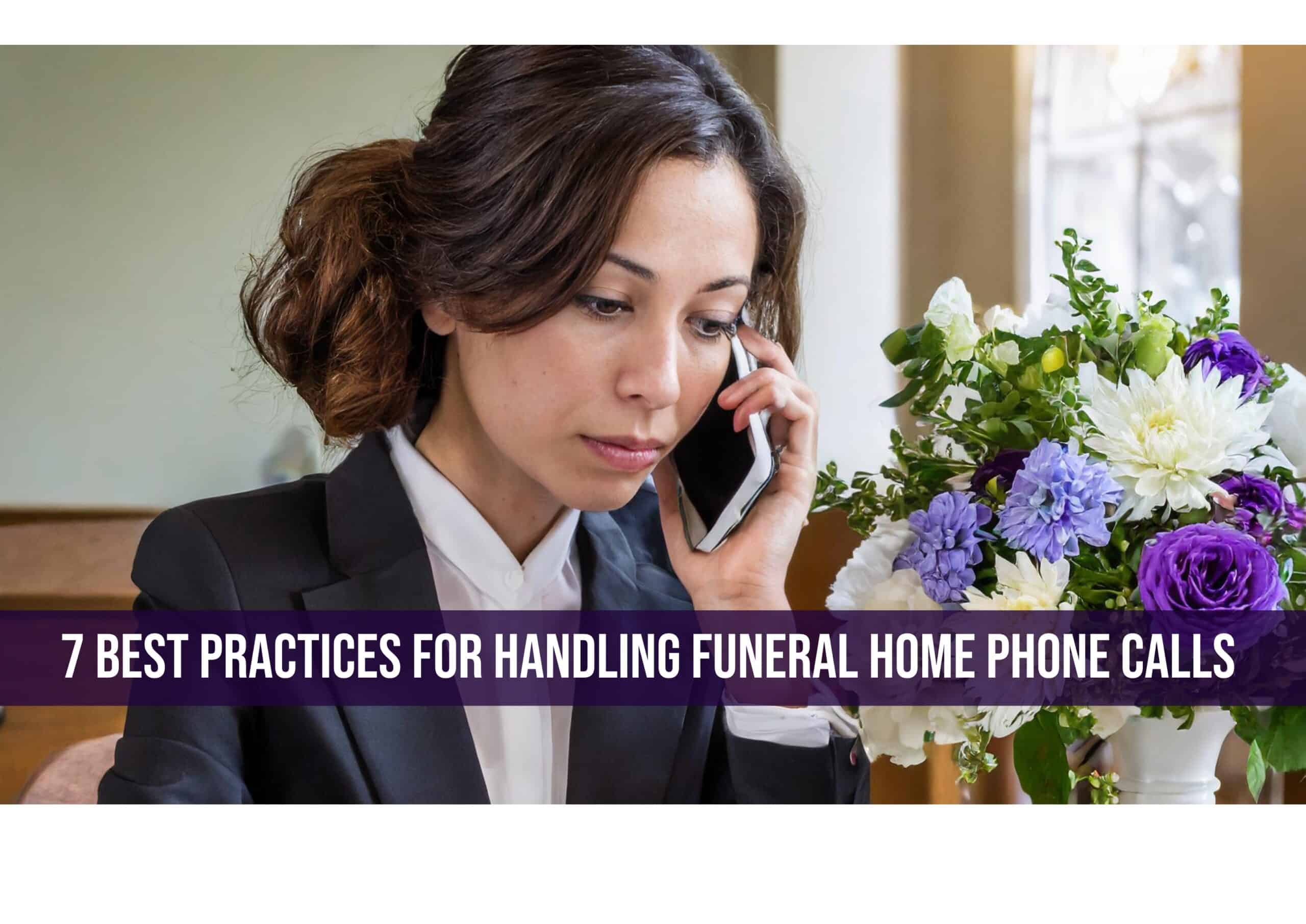
Here’s the thing a lot of people forget about grief: it does not look the same for every person. Sometimes, grief makes its entrance obvious, through sobs and loud expression. Other times, it arrives without ceremony in silent, steady tears. Then, there is the world of hidden grief, where bereavement conceals itself behind tightlipped mouths and downcast eyes. When trying to identify a person in need of comfort or support, you can rely on these visual cues to help you discern how best to help the person through their grief. When speaking to someone over the phone, however, your capacity for compassion is blindfolded, forcing you to rely on subtle clues to determine the emotional state of the person on the other line.
As funeral directors, it may at first seem inconsequential to consider the impact of telephone interactions on your relationships with the families you serve. After all, you will be able to offer support and comfort when you meet with the family in person during the arrangement conference. However, it is a mistake to dismiss the role these conversations play in shaping a family member’s opinion of your funeral home. During my 20-years of answering funeral home phone calls at ASD, there has been a continual increase in the number of calls that involve families contacting multiple funeral homes to compare not only prices, but service options and customer support.
In the past, most families would visit in person to make their funeral decisions, but today there is an increasing number of families that will base these choices on a single phone call. Families today are often living in different regions, forcing relatives to make funeral arrangements from out of town. Even when a person is predisposed to come to the funeral home for a meeting, it is rare for them not to first call and speak to a funeral director over the phone before that initial in-person interaction. This conversation often lays the foundation for the family’s relationship going forward. Learning how to ease someone’s distress and earn their trust without physically being in their presence is an essential skill that funeral professionals must work to refine.

Here are 7 best practice for handling funeral home phone calls. These tips can help you make the best impression when speaking with families over the phone.
1. Listen to the unspoken
Obviously, listening carefully to the words spoken by family members over the phone is an important concern. Active listening requires strong focus and a great deal of patience. You should also pay attention to the caller’s tone of voice and subtle cues such as a voice cracking or stopping short in the middle of a sentence. These are signs that something said has triggered an emotional reaction.

There is also a great deal of information communicated between sentences. A long pause or a sudden intake of breath usually mean the person is struggling to articulate what they want to say. You can help support callers by letting them know they can take their time. It is crucial to not make callers feel rushed off the phone in any way. In some cases, they may want to share lengthy stories or detailed descriptions before providing the information your funeral home needs to collect. Avoid the urge to interrupt callers who do this as it sends the message that you are too busy to support them in their time of need. Families should never get the impression they called at a bad time.
2. Be mindful of your tone of voice
While it is important to pay attention to the caller’s tonality, you must also be cognizant of how your own vocal inflection might be perceived by families. Conveying empathy and compassion with your voice is essential as it may be the very first thing a family member hears after their loved one’s passing. If you have any concerns about your or your staff’s tonality, consider using a voice recorder to evaluate your telephone voice and speech mannerisms. You can also use ASD’s MobileFH® feature to ensure calls made to families are recorded for future review or training purposes. This will also help you to identify and improve any communication habits.

One thing that may impact your tone of voice is your level of preparation before the call is initiated. A lack of certainty in your voice will definitely cause family members to doubt your expertise. Experience and repetition are often the best teacher, but you can take steps in advance before ever taking a funeral home phone call to ensure you sound informed. Write down a list of questions often asked by funeral home callers and create responses which best reflect your funeral home’s values. Review these answers in advance with your staff so your team knows how to respond to commonly asked questions. However, funeral home staff should avoid reading directly from the answer list during calls which may cause families to think the person on the other line sounds insincere or scripted.
3. Focus on building relationships
With every funeral home call you handle, one crucial question should be in your mind throughout the conversation: how can I put this caller at ease and make him/her feel more comfortable? Establishing trust with callers over the phone begins with seeking answers to this question. One of the easiest ways to build that foundation is with your introduction. Providing your name to callers helps to immediately humanize the interaction. It will also prompt the caller to share their own name with you which you can reference throughout the conversation. After sharing your name, be sure to state what your role is at the funeral home and mention your experience. This can assure the caller they are speaking to the right person. If possible, tell them to ask for you when they call again. These small but meaningful statements can do a great deal to help callers feel more at ease speaking with you.

4. Eliminate background noise and avoid distractions
Always consider your surroundings carefully before handling a call from someone grieving a recent loss. Nothing says, “I’m too busy and distracted to care about your family” like taking a call in a loud environment. Distance yourself from crowds and noisy settings when you know you may have to handle a call from the funeral home. Unexpected situations may arise, so if you can’t control where you are when a call first comes in, be sure to make every effort to find a more appropriate location to handle the call. Families will be more understanding if you ask them to wait a moment while you find a discreet location than if they feel like they have to compete for your attention.

5. Protect your funeral home’s phone lines
Some things in life are certain: it’s always darkest before dawn, what goes up must come down and a telephone line left unprotected will always result in missed calls. Okay…that last one doesn’t have quite as good of a ring to it (ba dum tss!), but that doesn’t make it any less of a certainty. Failing to properly back up your phone lines with call forwarding is a major misstep that can have an adverse effect on how families perceive your funeral home.

Through your local phone company, you can set your line to ring a certain number of times in the office and then forward to a secondary number such as a cell phone or answering service. This simple solution ensures funeral home phone calls that cannot be answered in time are not dropped or sent to a voicemail. Funeral professionals who plan ahead by using No Answer Call Forwarding, mobile technology and an answering service can gain a major competitive advantage over those who do not simply because their callers are able to reach them promptly.
6. Repeat important information back to callers
One of the first things covered in ASD’s 6-month training program is the importance of repeating vital information back to callers. Whether it’s a phone number, birth date, name spelling or social security number, it essential to confirm these specific details are correct. This rule should also be followed by funeral directors speaking to families as it serves multiple purposes. First and foremost, it ensures that the information gathered is accurate which is crucial when dealing with death care documents likes death certificates, obituaries and cremation authorizations. Second, it communicates to the caller that you are listening to them and understand what they are saying. This is especially critical if the person is crying, speaking quickly or calling from a room full of people—all of which are very common after a death of a loved one. Family members will have added peace of mind knowing their information has been obtained correctly.

7. Maintain detailed records of telephone history
Recording your funeral home phone calls with the combined assistance of a lead conversion service (for inhouse calls) and an answering service (for after-hours calls) can help you to train your staff and determine what telephone strategies work best for your funeral home. Many of the call tracking services offered by lead conversion companies now include advanced reporting tools that allow you to review helpful metrics, search keywords, and categorize your telephone history based on the type of message, call time and date, or other details. For calls that must be returned by funeral home staff after hours, ASD offers a mobile tool that allows funeral directors to place a call from their cell phone and have the outgoing call recorded and available to the entire funeral home team.
In addition to seeking out call recording solutions, it is always good practice to write down notes for future reference and make a thorough written record of your telephone conversations. This makes it simpler for you and your staff to know when a follow-up call should be made or if materials should be mailed. Documenting your telephone conversations also helps build relationships. Families are more likely to remember your funeral home over others if you take time to get to know them and their unique needs. Demonstrating that you took note of a small detail a person mentioned during their telephone conversation with you is a meaningful way to strengthen your connection with families.
Final Thoughts
A funeral home’s telephone customer service says a lot about how much those that own and operate the firm care about the families they serve. Everyone has had a bad telephone experience and knows how frustrating it can be. When the raw emotions that accompany grief are involved, however, the memory of such an experience can be even more upsetting. The person on the other end of that phone line is likely having the worst day of their entire life. Ensuring that families are supported with care and compassion through these extremely difficult interactions should be a top priority for every funeral home. Follow these best practices to ensure funeral home phone calls are always handled with sensitivity, respect and professionalism.

Related Reading
7 Tips for Funeral Homes to Elevate Customer Service with Enhanced Communication
4 Things You Can Do Today to Improve Your Funeral Home’s Customer Service
20 Favorite Moments Working at ASD The Last 20 Years


